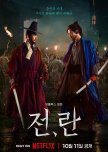
Esta resenha pode conter spoilers
A HEARTBREAKING YET BEAUTIFULLY CRAFTED FILM
*Uprising* is a heartbreaking yet beautifully crafted film that takes us on an emotional journey through the friendship of Jong-Ryeo and Cheon-Yeong, set in a time of brutal class divisions in historical Korea. The plot centers on how the rigid social hierarchy affects their lives, particularly Cheon-Yeong, a slave who is forced to endure countless hardships in place of Jong-Ryeo.What starts as a cruel situation—Cheon-Yeong being beaten in Jong-Ryeo’s stead—evolves into a deep bond. Despite the fact that Cheon-Yeong isn’t born a slave, his family’s downfall forces him into this role, and it's his strength and refusal to accept the established hierarchy that makes him stand out. When he begins secretly teaching Jong-Ryeo how to fight, the dynamics between the two change, leading to a friendship that feels genuine despite the social disparity.
However, the film doesn’t shy away from the harsh realities of their world. Even after helping Jong-Ryeo win a prestigious sword-fighting competition, Cheon-Yeong is denied his freedom by Jong-Ryeo’s father, who breaks the promise of releasing him from slavery. This betrayal deeply scars Cheon-Yeong, though Jong-Ryeo still tries to protect him by sending him off to fight the Japanese invaders, hoping this will finally earn him his freedom. The film is filled with these moments of hope and crushing disappointment.
After years of fighting, Cheon-Yeong returns home only to find the world he left behind in ruins. Jong-Ryeo’s family home has been burned down by the people who suffered under the oppressive rule of his father. In one of the film’s most gut-wrenching moments, Cheon-Yeong tries to save Jong-Ryeo’s wife and son from the flames, but she refuses his help out of pride, seeing him as a slave rather than a person who might save her life. Her death serves as a stark reminder of how deeply ingrained social prejudice was, even to the point of self-destruction.
The climax of *Uprising* sees a tragic reunion between Jong-Ryeo and Cheon-Yeong after seven years of separation. Jong-Ryeo, unaware of the full story, initially believes Cheon-Yeong is responsible for his wife and son's deaths. Their final confrontation is tense, but as the truth is revealed, the film shifts focus from their conflict to a bittersweet reconciliation. Just when they finally resolve their long-standing misunderstanding, Jong-Ryeo is mortally wounded in battle against the Japanese. Cheon-Yeong kills the Japanese leader, Genshin, in a satisfying act of revenge, but it’s too late to save Jong-Ryeo.
In Jong-Ryeo’s final moments, he asks Cheon-Yeong if they’re still friends, referencing an earlier lighthearted exchange from their youth. It’s a poignant moment that captures both the tragedy and beauty of their relationship. Despite everything that has happened, the film shows that love and loyalty can persist, even in death. This scene is devastating, but it offers closure, showing that their bond was real despite the cruel world they lived in.
On a larger scale, *Uprising* also critiques the corruption of the ruling class, embodied by King Seonjo, whose greed and cowardice lead to the suffering of the common people. His alliance with the Japanese and subsequent desertion of his own throne during the invasion sparks the uprising that defines the film. The subplot involving Seonjo and the infamous Japanese leader Genshin, known as the “nose-snatcher,” adds layers of historical context and brutality to the narrative. In a symbolic twist, Seonjo’s greed is punished when the treasure he’s promised turns out to be boxes of human body parts—noses, to be precise—reflecting the horrors of war and the consequences of his betrayal.
In the end, Cheon-Yeong and a few of his fellow survivors form a new community, symbolically named “Beom Dong,” meaning “A world together.” It’s a hopeful note to close the film on, but *Uprising* doesn’t let the audience forget the price paid for such unity. The film leaves you with a lingering sense that although there’s hope for change, the struggle against social inequality is far from over.
*Uprising* masterfully balances personal and political themes, offering a powerful meditation on friendship, loyalty, and the fight for justice. It’s a tearjerker that hits hard, especially as it reveals the lasting impact of societal divisions, even as it tries to inspire hope for a better future.
Esta resenha foi útil para você?
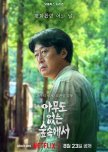
A frog (or frogs) dies from a stone thrown inadvertently
The Frog refers to an old Korean saying, “A frog dies from a stone thrown inadvertently”, which means people’s actions can have unintended negative consequences for others.“The Frog” is a pulse-pounding mystery thriller that seamlessly blends psychological tension with a high-octane narrative, making it a standout in the genre. Set across two distinct timelines, the series intricately weaves the fates of two men—Jeon Young-ha and Koo Sang-jun—whose lives are irrevocably altered by the presence of mysterious strangers and tragic events.
Young-ha, a reserved pension owner deep in the forest, finds his quiet life shattered when the enigmatic Yoo Seong-ha checks into his property. What begins as an innocuous visit quickly spirals into a nightmare as Seong-ha’s obsession with the pension pulls Young-ha into a game of manipulation, fear, and survival. Her presence is not just a disruption; it’s a catalyst for a series of increasingly disturbing events that push Young-ha to the brink.
In parallel, the series revisits the summer of 2000, where Sang-jun, a well-meaning motel owner, faces a different kind of horror. During the IMF crisis, a single act of kindness—offering a room to a stranded stranger—leads to an unthinkable tragedy that destroys his family and his livelihood. The show explores the psychological unraveling of Sang-jun as he grapples with guilt, public scorn, and the slow disintegration of his once-happy life.
Chief Yoon Bo-min, a tenacious detective who connects both timelines, adds another layer of tension as she digs into the mysterious happenings, driven by an intuitive sense of something deeply wrong. Her pursuit of the truth brings her dangerously close to the chaos surrounding both men.
The narrative is tightly wound, with each episode ramping up the stakes. The show is visually stunning, with beautiful mise-en-scenes that contrast the serene settings against the underlying dread.
One negative thing I found was that the transitions between the two timelines were not very seamless and can be confusing at first.
The terror comes from within—how far ordinary people can be pushed before they break.
In essence, “The Frog” is a suffocating, high-stakes drama that examines the devastating consequences of guilt, obsession, and the human capacity for both resilience and destruction. It’s a ride that leaves you breathless, with each episode escalating in intensity until the explosive conclusion.”
Esta resenha foi útil para você?
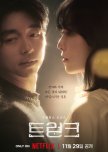
Love is temporary and marriage is a service
"The Trunk" is an enthralling mix of romance, mystery, and emotional drama that intricately weaves together the lives of its complex characters. At its core, the series explores the fragility of human connections and the lengths people go to protect their secrets, blending suspenseful twists with deeply personal moments.The story centers around Noh In-ji, a field wife working for a marriage service company, and Han Jeong-won, a gifted but emotionally fractured music producer. When they enter a contract marriage, both carry emotional baggage that gradually surfaces—In-ji from a string of failed relationships and a painful betrayal, and Jeong-won from a past haunted by unresolved guilt and a toxic relationship with his ex-wife. Their initially transactional bond slowly transforms, revealing their vulnerabilities and sparking an unexpected intimacy.
What sets *The Trunk* apart in the ocean of contract marriage K-dramas is its ability to balance layered storytelling with sharp social commentary. The concept of contract marriages serves as a metaphor for modern relationships—transactional yet yearning for depth. The show doesn't shy away from themes like betrayal, emotional manipulation, and the scars of childhood trauma, but it handles them with sensitivity and nuance.
The characters are the lifeblood of this drama. Noh In-ji is a fascinating protagonist—a woman who seems unshakable on the surface but harbors deep emotional wounds. Her journey of self-discovery is as compelling as her dynamic with Jeong-won. Han Jeong-won, meanwhile, is a man trapped in his past, struggling to reconcile his unresolved feelings for his ex-wife with his growing affection for In-ji. The supporting characters, particularly Jeong-won's enigmatic and complex ex-wife Lee Seo-yeon and the unsettling stalker Eom Tae-seong, add layers of intrigue, ensuring the plot never loses its momentum.
The production quality is top-notch. The cinematography captures both the tension and intimacy of the characters’ lives, with dimly lit interiors and wide shots of isolated landscapes mirroring the characters' emotional isolation. The music, composed with a mix of melancholic strings and ambient tones, enhances the mood, making even the quietest moments resonate deeply.
Ultimately, The Trunk is more than just a romance. It’s a deeply human story about facing the shadows of the past, learning to trust, and finding meaning in unexpected connections. The title trunk does not point toward the actual trunk. the trunk here is metaphorical, about all the past traumas each character carries.
Esta resenha foi útil para você?
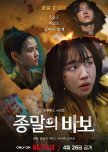
A good philosophical show with a bad pilot
The first three episodes present a disorienting experience for viewers, with a narrative structure that lacks clarity and coherence. The plot jumps haphazardly between different timelines without clear indication, leaving audiences struggling to piece together the sequence of events. Flashbacks blend seamlessly with present-day scenes, further complicating the understanding of the storyline. This lack of a clear timeline detracts from the overall viewing experience, making it challenging for viewers to fully engage with the narrative.Furthermore, the abundance of characters introduced in the early episodes adds to the confusion. While an extensive cast can enrich the storytelling by providing diverse perspectives, this show struggles to effectively develop each character amidst the chaos of its narrative. As a result, many characters feel underutilized or underdeveloped, diminishing their impact on the overarching plot.
Despite its shortcomings, it" begins to find its footing in the fourth episode, as the narrative begins to coalesce and the timelines become more discernible. The characters, once disparate and disconnected, begin to intertwine in meaningful ways.
So, is a philosophical drama with grand aspirations, marred by its initial confusion and lack of coherence. While the early episodes may leave viewers feeling adrift in a sea of disjointed narratives, the series gradually finds its footing and delivers a more cohesive and engaging experience.
Esta resenha foi útil para você?

This is a bad drama!
This is predictable and boring, hence a bad drama! Overused concept, like, is it 2010?They should stop making shows like these now!
A borefest from start to end. I was going to drop it at ep 3, but one of my ex-friends threatened to pull my nails out, so I had to waste my time over this.
Anyone who finds this drama good needs to get some help. There is something seriously wrong with them up there.
Esta resenha foi útil para você?
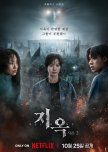
Esta resenha pode conter spoilers
A Thrilling Descent into Chaos
*Hellbound* Season 2 wastes no time plunging viewers back into its dark, morally complex universe where divine judgment and human corruption intertwine. This season raises the stakes, delving deeper into the mysteries surrounding the resurrection phenomenon while expanding its character dynamics in ways both shocking and exhilarating.The return of Jinsu (Kim Sung-cheol): His visions and ultimate transformation into one of the very monsters that once terrified humanity underscore the show’s central theme: no one is above judgment, not even the messiah-like figures they create.
Kim Jeongchil’s political machinations, in alliance with the government, form another key pillar of the season. His desperate attempt to maintain control over the New Truth by using Park Jungja (Kim Shin-rok) as a pawn adds a layer of intrigue and treachery.
Thematically, this season explores the devastating consequences of blind faith and power-hungry institutions. The New Truth’s “Resurrected One” plan, though initially grand in its ambition, becomes a symbol of their crumbling control. The demonic monsters serve as an ever-present reminder that divine retribution, though wielded by men like tools, remains uncontrollable and terrifying.
Meanwhile, Hyejin (Kim Hyun-joo) continues to act as the moral center of the show, pushing against the tide of corruption and madness. Her rescue mission for Park Jungja is one of the season's most thrilling arcs, showcasing her resilience and determination to protect the innocent, even in the face of overwhelming odds. The poignant moment of Jungja reuniting with her son provides a much-needed emotional reprieve amidst the chaos.
Director Yeon Sang-ho masterfully balances action, horror, and character-driven drama, creating a tense, chaotic atmosphere that builds relentlessly toward the finale. The introduction of new power players like Senior Secretary Lee, who manipulates events from the sidelines, adds political intrigue that complements the show’s exploration of spiritual fanaticism.
While the season provides plenty of answers, it also raises new questions, particularly about the resurrection and the true nature of divine judgment. The ending leave the future wide open for another chapter, rife with potential.
In short, *Hellbound* Season 2 intensifies its exploration of morality, faith, and the consequences of power, delivering a season that is as thought-provoking as it is thrilling. It masterfully intertwines human emotion with its dark, supernatural premise, making it a must-watch for fans of psychological and religious horror.
Theories I found good:
While Jin-su taunts Se-hyeong for wasting his last chance by trusting Jin-su, it is ultimately proven to be Jin-su who wastes his resurrection. He spends his second chance the same way he did most of his first life: selfishly, seeking a salve for his emotional pain without care for the pain he knowingly inflicts on others. Jung-ja’s declaration is its own kind of decree, as Jin-su realizes they are not the same.
Jae-hyeon may have a latent power, just as Jung-ja does.
What we do in this life—and how we care for each other—does matter. Even when Jin-su came back from hell, he feared he might still be in it. We create our own hell, individually and collectively, and even when there is a supernatural power also getting in on the game.
Stories have power, and Hye-jin is giving Jae-hyeon a good and true one. It is the kind of story that Jin-su was never told when he was little and alone. The kind of story Secretary Lee, the New Truth Society, or the Arrowhead would never bother telling because it doesn’t feed the kind of fast, uncaring power they are looking to grow. The kind of story Detective Jin Kyung-hun (Yang Ik-june) tells his daughter, Hee-jung (Lee Re), as she dies from cancer in his arms. Hee-jung lived most of her life under the thrall of Jung Jin-su and his empty promises, but it’s a family picture, a story of love, that gives her comfort in her final moments.
Esta resenha foi útil para você?
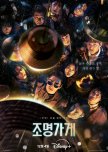
Esta resenha pode conter spoilers
A Soul-Stirring Exploration of Life, Death, and Redemption
"Light Shop" is an emotionally gripping and thought-provoking narrative that masterfully blends supernatural intrigue with deeply personal stories of love, loss, and redemption. This series takes viewers on a poignant journey through the lives of characters who are trapped between life and death, all connected through an enigmatic light shop. With its rich character development, stunning visuals, and poignant exploration of the human condition, this show stands out as a must-watch for fans of supernatural dramas and psychological thrillers.PS: If anyone doesn't want any spoilers, scroll straight to the "conclusion" part.
Plot and Storytelling:
The concept of "Light Shop" is deceptively simple but profoundly complex. At its heart, it is a story of interconnected souls—each character grappling with their own past, regrets, and unfulfilled desires. What begins as an eerie, horror-like atmosphere, gradually transforms into an exploration of hope and second chances. Light Shop itself serves as a metaphorical crossroads where souls meet and interact, discovering not just the truth about their own lives but also the way their destinies are woven together.
The storytelling is nuanced, shifting seamlessly between different character arcs that initially seem unrelated. However, as the narrative unfolds, the viewer begins to see how these disparate lives intersect, all leading to a heartbreaking yet redemptive climax. Each episode builds tension, gradually revealing the layers of each character's tragic past and the complex emotional journeys they undergo. The pacing is well-balanced, ensuring that while the story has its emotional moments, it never feels rushed or heavy-handed.
Character Development:
The strength of "Light Shop" lies in its cast of deeply human characters, each of whom brings a unique perspective to the story. From Jeong Won-yeong, the mysterious and compassionate guardian of the afterlife, to Lee Ji-young, a woman whose love for her deceased boyfriend transcends death, each character is richly layered, with their own emotional baggage and desires. Their arcs are deeply interwoven, creating an intricate web of relationships that explores the themes of sacrifice, memory, and the pain of unspoken love.
Particularly compelling is the tragic story of Kim Hyun-min and Lee Ji-young. Their love transcends the boundaries of life and death, with Lee Ji-young's determination to save Kim Hyun-min, even after her own death, showcasing the lengths to which the human heart will go for love. The emotional depth of these characters is heart-wrenching, and their unresolved love story will undoubtedly leave viewers reaching for the tissues.
The transformation of Yang Seong-sik, a detective turned grim reaper, adds another layer of complexity to the story. His journey from skepticism to acceptance of his new role and his eventual involvement in guiding souls through the afterlife is both tragic and uplifting.
Themes and Symbolism:
"Light Shop" is rich with themes of memory, fate, and the blurry line between life and death. The concept of light as both a literal and figurative guide is central to the series, with each character’s story revolving around the choices they make when faced with death and the "light" that ultimately leads them to redemption or eternal separation. The lighting store itself symbolizes the fragile nature of life, offering solace, guidance, and sometimes, a second chance.
The show's exploration of life after death is presented in a way that feels both otherworldly and deeply relatable. It asks existential questions about the nature of our lives, our connections to others, and what happens when our time on Earth runs out. The characters' emotional arcs resonate universally, even though the setting is supernatural.
Visuals and Atmosphere:
The cinematography in "Light Shop" is stunning, with beautifully composed shots that emphasize the mood of each scene. The lighting, of course, plays a pivotal role in creating the atmosphere—whether it’s the soft glow of a light bulb or the dark, haunting street where characters wander, the use of light and shadow adds an eerie yet comforting dimension to the story. The show's visual style enhances its emotional depth, making each moment feel weighty and impactful.
Conclusion:
"Light Shop" is an unforgettable journey into the afterlife that not only explores the supernatural but also delves deep into the human experience. With compelling characters, a beautifully layered plot, and themes that resonate on a deeply emotional level, it is a show that stays with you long after the credits roll. Whether you're drawn to stories of love that transcend death, or you're interested in exploring the mysteries of the afterlife, "Light Shop" offers a unique and enriching experience that is as heartbreaking as it is uplifting. This series is a rare gem that reminds us of the fragility of life and the enduring power of love and memory.
A masterpiece in every sense. Highly recommended.
Esta resenha foi útil para você?
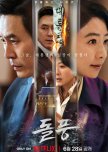
Acting battle between Sul Kyung-gu and Kim Hee-ae
"The Whirlwind" is a gripping political thriller that masterfully intertwines complex characters and relentless plot twists. It follows the intense power struggle between Prime Minister Park Dong-ho and Deputy Prime Minister Jeong Su-jin, each maneuvering through corruption, manipulation, and vendettas.The series excels in character development, portraying grey figures whose motivations blur the lines between good and evil. The pacing keeps viewers on edge, with each episode delivering new surprises and strategic battles. The show's strength lies in its ability to maintain suspense while exploring themes of ambition, morality, and the consequences of power.
With a dramatic and satisfying conclusion, "The Whirlwind" leaves a lasting impression.
Esta resenha foi útil para você?
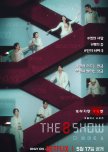
Esta resenha pode conter spoilers
The most realistic show ever
The 8 Show might seem like a pale nod to Squid Games, but to an extent it’s more nuanced and extravagantly structured, sans all the unflinching fatality because the small sample size naturally precludes elimination by death. rather than being packed with conflicts that highlight the friction between the good and bad, T8S is thematically predicated on class demarcations in a controlled microcosm of the society. far from being a mere depiction of moral erosion by virtue of greed, it simply mirrors the hierarchical propensity socially wired into us through eons of evolution. the paralel is uncannily resounding, as much as it’s painfully redolent.my interpretation of such parallel is as follows:
Floor 8: The wealthiest, holding in possession an abundance of resources, and given the scarcity of the resources, vested with shot-calling powers and the authority to dictate everything underneath them.
Floor 7: Government/Legislator, formulating laws and regulations at the behest and in the interest of the affluent few.
Floor 6: Police, enforcing brutality in the event of opposition or protests in service of its tyrannical government.
Floor 5: Pacifist who tries in earnest to strike a happy medium and go to bat for the common weal, but mostly stuck in between with resigned helplessness.
Floor 4: fence-sitting, slimy sycophant who’s ready to jump on the coattails of the dominant when it benefits them.
Floor 3: the down-and-out proletariat who works their fingers to the bones only to be perpetually trampled upon.
Floor 2: the heroic and altruistic figure who wants to defend the weak but finds themselves powerless anyway against the domineering coalition up top.
Floor 1: the physically disabled, habitually scorned and considered dregs of the society.
Ranking the Characters from Best to Worst (Spoiler Alert: None of Them Are Good People):
Floor 7: He may be the smartest in the room, but he's not very clever. There were plenty of solutions to problems that he was too lazy to consider.
Floor 3: Pure neutral. Despite being guilt-tripped into taking Floor 1's place, he shows his strong moral compass during the King incident.
Floor 8: A controversial opinion, but the group's initial alienation of her led to their downfall. She was overly helpful at first, figuring out how to add time and contributing the most to the talent show. Yet, they voted to punish her the next day? She was right to rebel against the system, in my opinion. Floor 6 is to blame for turning it into something more sinister.
Floor 2: Despite what eventually happens, her villainizing of Floor 8 set the tone for discord. Throwing a tantrum when free money is being thrown at you came off as petty.
Floor 5: She wasn’t fully aware of her choices.
Floor 4: Made her decisions to survive.
Floor 6: Self-explanatory. Horrible character all around.
Floor 1: This character frustrated me the most because everyone gave him so much grace. He's worse than Floor 6 because he knows what it's like to feel helpless and still chooses to act selfishly. Plus, going after Floor 4 instead of Floors 6 or 8 shows his lack of moral character since she clearly wasn’t the brains of the operation.
Esta resenha foi útil para você?
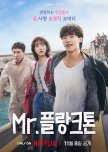
love, loss, and personal growth
Mr. Plankton tells the story of Hae Jo (Woo Do-hwan), a man with a terminal illness, who seeks closure by finding his biological father. His path crosses with his ex, Jo Jae-mi (Lee Yoo-mi), and they embark on a road trip, where they confront past regrets and their complicated feelings for each other. Jae-mi’s infertility and relationship struggles with her fiancé, Eo Heung (Oh Jung-se), add further emotional depth. In the series’ poignant finale, Hae Jo accepts his fate, while Jae-mi faces the difficult choice between her past and future. The ending offers a bittersweet but hopeful message about love, loss, and personal growth.Esta resenha foi útil para você?
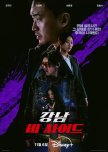
A Gritty Crime Thriller Where Revenge and Corruption Collide
*Gangnam B-Side* (as of Episode 6) has proven to be a gripping and intricate drama, blending intense character development, dark themes, and a maze of morally complex choices. Set in the underbelly of Gangnam, it explores the dangerous world of power, corruption, and the exploitation of vulnerable people. The show does a great job of painting its characters as deeply flawed yet compelling, particularly with its leads, who are constantly caught in the tension between seeking revenge and protecting those they care about.The central plot revolves around the criminal activities of Gangnam Trading, led by Joon-seo and various other powerful figures, including Choi and Tak. The illegal trafficking of drugs like Neon and the exploitation of escorts add a sense of urgency and suspense to the narrative. Characters like Dong-woo and Gil-ho have become somewhat tragic figures, driven by guilt, revenge, and a sense of justice, though often falling short in their attempts to protect others.
The pacing has been relatively well-balanced, with the first few episodes establishing key relationships and tensions, while episodes 4 through 6 really ramp up the stakes. There’s a delicate interplay of personal vendettas and larger criminal conspiracies, and the show delves deep into the emotional toll these secrets take on its characters. Episode 6, in particular, marks a turning point with a huge revelation regarding Gil-ho’s past and his identity, which adds another layer of mystery to his motivations.
The themes of power, betrayal, and guilt are consistently explored throughout the episodes, with each character’s arc being carefully developed. While the show can be dark and at times a little slow in its buildup, it rewards patience with intense moments and twists that keep the viewer invested. The cinematography, particularly the use of neon lights and the atmospheric tension of the scenes, also contributes significantly to the show’s tone.
There are hints of resolution in the near future, but with two episodes remaining, it seems that *Gangnam B-Side* still has plenty of dramatic developments to unfold. The final episodes are likely to tie together the fates of its main characters, who have been caught in a web of crime and vengeance, though it’s unclear who will come out on top in the end.
In short, *Gangnam B-Side* is a tense and thrilling watch that pulls you into its gritty world of crime and power, while exploring complex character dynamics and deep emotional stakes. If you're a fan of dark crime dramas that blend mystery with intense personal conflicts, this show is definitely worth a watch.
Esta resenha foi útil para você?
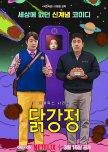
A perfect webtoon adaptation!
I started this show thinking it'd be just a gag, but there was a lot - sci-fi, 'punch in the gut scenes'... a very detailed show and a perfect weekend watch. Though there are some curses, so I'd not recommend watching it with kids.PS: The webtoon writer is really smart to even think of such a plot.
Esta resenha foi útil para você?
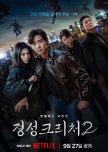
Esta resenha pode conter spoilers
A bad season!
After the first four episodes, I was well and truly invested. Although the modern-day setting lends the second season a different flavor, the callbacks and connections to season one occur gradually and organically, almost in sequence with Ho-jae's recovery of his memories.The episode three action sequences. I understand that shrouding scenes in darkness are true to how the lighting would look in those environments, but when it's coupled with the rapid editing style of the fight sequences, it sometimes makes it difficult to follow exactly what's going on in those scenes.
Obviously, the budget was on the finale so the fight sequences were quite better and well-lit. Other than that, no cliche plot lines and good integration of past to present timelines.
This season is edgier and the storyline seems more compelling. Also feel like the chemistry is off the charts this time. Though the first season had good world building and layered characters, while this one has the complete opposite.
Seong Jo's motivation is so fucking stupid.
Why did Chae-ok not keep tabs on Tae Sang. I get the melodramatic we can't be together sentiment, but you would still like to be aware of the love of your life being dead or alive, which in fact would have helped her realise that he's also like her now.
I loved the twists though.
Esta resenha foi útil para você?
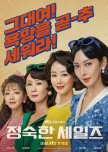
Quiet Sales
The premiere episode of "A Virtuous Business" sets the stage for an intriguing and refreshing story set in the early 1990s. The show dives into the lives of four women, known as the *Bangpan Sisters*, who find themselves in an unconventional line of work—selling adult products door-to-door in a conservative rural village. This unique premise immediately stands out, offering a blend of comedy and heartfelt moments, all while tackling societal norms of the time.The episode introduces us to Han Jung-sook, a housewife struggling with financial pressures. Her character brings an emotional depth to the story as she navigates her responsibilities as a mother and wife, while also rediscovering her own potential. Kim So-yeon's portrayal adds a level of authenticity, drawing viewers into Jung-sook's quiet yet powerful transformation. Her entrance into this sort of business and her motivation are portrayed nicely.
Alongside her, we meet the other Bangpan Sisters, each with their distinct personalities and motivations. Though the focus is currently on Jung-sook, they got to shine too.
The show’s humor is well-balanced with moments of reflection, as the characters face the realities of stepping into a business that challenges traditional values. The cinematography, capturing the rural 90s aesthetic, adds a nostalgic charm to the show, while the writing is sharp and witty, delivering social commentary in a subtle, humorous way.
PS: People review bombing this because it challenges your narrow worldview is like throwing a tantrum over a mirror showing you exactly how small-minded you really are.
Esta resenha foi útil para você?
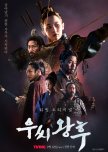
Esta resenha pode conter spoilers
A Mesmerizing Tale of Power, Betrayal, and Redemption
*Queen Woo* has undoubtedly become one of the most compelling historical K-dramas of the year. From the very first episode, the show pulls viewers into a world brimming with intricate power dynamics, political betrayals, and the fierce determination of its titular character, Queen Woo. Set against the backdrop of the Goguryeo kingdom, the series masterfully combines elements of historical drama, court intrigue, and personal vengeance, making it an emotional rollercoaster filled with tension and drama.**Plot and Narrative Structure:**
The storyline of *Queen Woo* is multifaceted and fast-paced, weaving together personal vendettas, family feuds, and a deeply complex political landscape. The series balances flashbacks with present-day events, constantly revealing critical information from the past that affects the motivations and actions of the characters in the present. This nonlinear approach works to its advantage, as it enriches the narrative and adds depth to the central conflicts.
At the heart of the plot is Queen Woo, a sharp and resilient woman who is thrust into the treacherous world of royal politics. Her journey is one of survival, as she navigates the dangers posed by ambitious clans, manipulative advisors, and even her own family. As the episodes unfold, we witness her transformation from a pawn in the power struggles of men to a formidable ruler in her own right, determined to protect her people at all costs. The show's narrative is filled with unpredictable twists, keeping viewers on edge as alliances shift and betrayals surface.
**Characters:**
The strength of *Queen Woo* lies in its well-developed and nuanced characters. Queen Woo, played brilliantly by the lead actress, is the epitome of a complex heroine. She starts as a woman struggling to assert her agency in a patriarchal society, only to grow into a calculating and powerful leader. Her emotional arc—from a wife deeply in love with the late king to a strategic warrior queen—is what drives the show. The moments where she displays vulnerability are just as compelling as her cold, calculated political moves, making her character both relatable and awe-inspiring.
The supporting cast is equally impressive. Eul Pa-so, initially a manipulative advisor with his own hidden agendas, evolves into a fascinating character. His slow realization that the queen is the same girl who defeated him in chess years ago subtly transforms him from a schemer to an unexpected ally, adding a touch of depth to his internal struggles. His ultimate decision to support the queen in their shared dream of a new Goguryeo is a standout moment of the show.
Other characters, like Woo-soon (Queen Woo’s scheming sister), Bal-ki (the ruthless antagonist), and Yeon-woo (the idealistic prince), each bring their own layer of complexity and drama to the series. Even the antagonists are given emotional weight, with their motivations rooted in personal ambitions, insecurities, or a deep sense of betrayal, making them feel like fully realized individuals rather than one-dimensional villains.
**Themes and Symbolism:**
Beneath its action-packed plot, *Queen Woo* explores several thought-provoking themes, including the role of women in power, loyalty, family duty, and the struggle for identity. The show deftly comments on the societal constraints placed on women, particularly through Queen Woo’s fight to step out of the shadow of male domination and assert her authority in a world that seeks to undermine her at every turn. Her defiance against these limitations is not just a personal battle; it is a statement against the rigid norms of her time.
The use of symbolism is also notable, particularly with chess. The recurring chess game between Queen Woo and Eul Pa-so symbolizes their ongoing power struggle, with the queen ultimately outsmarting him, both on the chessboard and in real life. The ancestral swords sent to the five clans as a call to honor their ancestors’ pledges is another powerful image, tying the past to the present as characters grapple with their loyalty to history versus their own ambitions.
**Production and Cinematography:**
Visually, *Queen Woo* is a feast for the eyes. The show’s set designs, costumes, and battle sequences are all meticulously crafted, transporting viewers into the grandeur and brutality of Goguryeo’s royal court. The cinematography is particularly strong during scenes of conflict, from the queen’s bow-and-arrow duels to large-scale battles, capturing both the beauty and chaos of war. The use of lighting and camera angles during more intimate, emotional scenes, such as the queen’s quiet moments of grief or contemplation, enhances the mood and draws viewers into the emotional core of the story.
The action sequences are choreographed with precision, and while the show does not shy away from depicting the brutality of the time, it never feels gratuitous. Instead, each battle or confrontation is loaded with meaning and stakes, keeping viewers engaged not just by the spectacle but by the weight of the consequences.
**Critique:**
While *Queen Woo* excels in many areas, it is not without its minor flaws. At times, the pacing can feel rushed, especially as the series nears its conclusion. Some subplots, particularly those involving secondary characters like Bal-ki and the Crown Prince, feel underdeveloped. Their motivations, while clear, could have been explored with more nuance to fully flesh out their roles in the final conflict. Additionally, the show’s reliance on flashbacks can be disorienting, especially when multiple timelines converge at once.
Moreover, the emphasis on the queen’s romantic relationships, particularly her bond with Yeon-woo, occasionally detracts from the central political narrative. While it adds a layer of emotional complexity to the queen’s character, some viewers may feel that the romance plotline slows down the otherwise tightly woven story of political strategy and war.
**Final Verdict:**
*Queen Woo* is a triumph in historical drama, offering a captivating portrayal of a queen’s rise to power amidst chaos and betrayal. Its rich character development, layered storytelling, and stunning visuals make it a standout series that will leave a lasting impression. While it may have its pacing issues and underdeveloped subplots, the show’s emotional depth and dramatic tension more than make up for it.
With a powerful female protagonist leading the charge and a story that deftly combines political intrigue with personal growth, *Queen Woo* has earned its place as one of the most memorable K-dramas of the year. It’s a must-watch for fans of historical epics and those who appreciate a character-driven tale of empowerment, loyalty, and the lengths one will go to for the greater good.
Esta resenha foi útil para você?

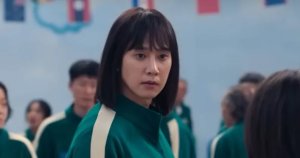
 1
1





















